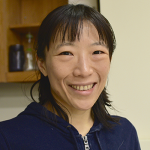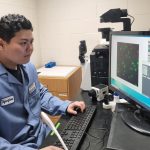Honggang Cui Aims to Improve Protein Purification with New Award

Honggang Cui, a core member of Johns Hopkins University’s Institute for NanoBioTechnology (INBT) and associate professor of chemical and biomolecular engineering, has received a $1.8 million award through the National Science Foundation’s Design Materials to Revolutionize and Engineer our Future (DMREF) program. The funding will support efforts by Cui and collaborators from the University of Chicago, Northwestern University, and Bristol Myers Squibb, in developing new technologies for protein purification.
Affinity chromatography, today’s most commonly used protein purification technique, has multiple drawbacks, including its high cost, the risk of contamination it poses, and inefficiency. Cui and his team are laying the foundation for a new non-chromatography technology designed for industrial manufacturing that will eliminate these obstacles, enable us to realize fully the benefits of related technologies, including recent advances in culturing mammalian cells, and meet the growing demand for proteins, resulting in large part from an increased interest in using proteins to treat human diseases.
Proteins are involved in nearly all cell processes, such biological reactions, cell movement and communications, and transporting molecules. Because of their significance, researchers seek to better understand their purpose and potential use as therapeutics. Once a protein is identified as a therapeutic target, it is synthesized by cells and separated from its biological source, which usually is a solution of many cellular components, and then purified to remove contaminants. This complex process is one of the primary reasons for the high cost of manufacturing protein therapeutics.
Cui and his team seek to improve this process by using self-assembling peptides (short chains of amino acids) to create a molecule that better captures more of the proteins of interest. Once proteins are captured, they undergo a transition and precipitate out from its biological source. This affinity precipitation method does not require the use of a column, which addresses the limits to large-scale protein production used in affinity chromatography.
The Cui team and the University of Chicago team, led by Matthew Tirrell, will primarily lead the experimental process of the study. The team at Northwestern, led by Monica Olvera de la Cruz, will design multiple computational models ,while Xuankuo Xu at BMS will help identify and provide the appropriate peptide ligands and protein products to use, a cost analysis, and feedback on the potential to commercialize the technology. BMS has been funding the research in the Cui lab for over five years, aiming to co-develop new technologies for protein purification.
The NSF support also will be used to develop education outreach opportunities for Baltimore and Chicago undergraduate students, with a goal of establishing an undergraduate exchange program that will enable participating students to work in several laboratory, as well as, industry settings, An additional outreach program will involve creating activity modules for K-12 students along with videos about their work.
The DMREF is the primary program through which the NSF participates in the larger Materials Genome Initiative and is a multistakeholder effort developed by the Office of Science and Technology Policy and National Science and Technology Council to develop infrastructure to accelerate advance materials discovery and deployment in the United States.
Story by Gina Wadas





